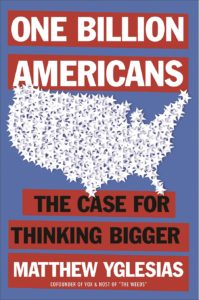Faced with impending climate doom, extreme housing shortages, and a global pandemic that spreads through close human proximity, most people hope Americans will get fewer and farther between. In his new book, One Billion Americans: The Case for Thinking Bigger, Matthew Yglesias, the 39-year-old cofounder of the news website Vox and host of the podcast The Weeds, argues that all of these issues are better tackled by a U.S. population that’s triple its current size.

Yglesias is less wedded to the one billion count than he is to “thinking bigger” — the figure seems to function mostly as a fun point of comparison. Though a billion-person America would be vastly different from the roughly 330-million-person nation that exists today, it would still be significantly less densely populated than peer countries in Europe. The point being: the idea of having many more American citizens is not that crazy.
Yglesias argues that massive population growth is the galvanizing notion that could finally restore American hegemony and achieve everything from paid family leave to newfound prosperity in the Rust Belt. “The One Billion Americans agenda,” he writes, “is about returning to America’s geopolitical posture at its best, not domineering but self-confident that our country is secure and strong, and that our economic and social system is in fact superior and will be adopted at the end.” He prescribes a European-style social safety net that’s meant to bolster the fertility rate and an expansive, merit-based overhaul of the immigration system. More Americans, he says, will lead to more innovation, more competition, and sustainable economic development.
The book strikes a decidedly optimistic tone. Yglesias argues that the U.S. can and should remain the world’s leading superpower — a statement he says is “uncontroversial,” though that’s likely to be the case only for a conservative swath of the electorate that would probably oppose massive population growth.
Arguments against such growth hinge on the idea that the American economy is a zero-sum game. From this perspective, spreading the wealth of this country’s natural resources among more and more residents would impoverish the nation. “But today, most people don’t work in farms, mines, or factories,” writes Yglesias. “They work in schools, hospitals, restaurants, stores, bars, yoga studios, and salons. And the ‘fertile land’ that people in these lines of work need is access to other people.”
Once this scene is set, Yglesias counters possible objections to a billion-person America one by one. Housing shortages in already overcrowded cities can be solved through pro-development policies and rezoning. Congestion-based tolls, modeled after those successfully implemented in Sweden, should replace the gas tax and prevent traffic jams. Public transit projects should be modeled after the cheaper, better ones in Europe.
The federal government should decentralize, moving headquarters of agencies like the Bureau of Engraving and Printing to shrinking cities like Cleveland or St. Louis. Likewise, there is no reason for Silicon Valley, overflowing as it is, to host so much of the nation’s tech industry. The struggling news industry should ditch its high-rent headquarters in Washington, D.C., and New York City in favor of cheaper digs midway between, in Philadelphia.
One objection Yglesias claims to take especially seriously: won’t tripling the American population lead to an extreme rise in greenhouse gas emissions?
Keeping global populations poor for the sake of preventing further climate damage, he argues, would be deeply immoral. On the other hand, because climate change will disrupt certain parts of the world more harshly than others, “reducing barriers to population movement is a highly effective way of reducing warming’s costs.”

According to the author, innovation, largely spurred by immigrants, will solve climate change — so long as policy makers fund the easy stuff, such as targeted research and development, “basic science,” and early deployment. Here, Yglesias once again leans on the idea that modern living standards are more dependent on innovation than natural resources. This is “the fundamental reason that population growth increases rather than reduces prosperity,” he writes. “The climate problem raises the stakes but doesn’t fundamentally alter the calculus.”
The author seems to think there is no threshold, no point at which population growth becomes a problem. Or, perhaps, he thinks the realization of his own hope for one billion Americans is so unlikely that the environmental implications aren’t worth following up on. A bigger, better, greener, more marketable approach to climate change isn’t played out here in an innovative or detailed way.
Instead, he claims there is plenty of space in the U.S. and plenty of resources for a prosperous tomorrow, if only we could “break out of the current dysfunctional veto-laden approach to building things, and find a way back to a future-oriented mindset that says change is good.” This is the fundamental prerequisite to his agenda: that Americans should embrace change.
One Billion Americans presents many interesting, progressive ideas. But so does the Democratic Party’s platform this year, and even the “Priorities” page of Sen. Ed Markey’s website. Maybe the push toward a more densely populated America will be the policy agenda that overcomes the stagnation and dysfunction in its politics today — but calls for welcoming foreigners and more “responsible public figures” have achieved little to date.



